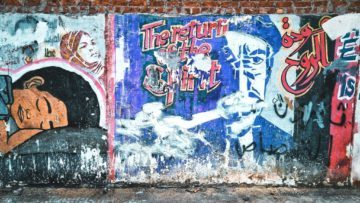Raaza Jamshed in Guernica:
 My house is isolated, up on the tip of a hill overlooking the Mediterranean Sea, but daybreak sounds rise and reach my window, where I sit reading your book. Someone heckles from a road below to someone else, whom I imagine is trudging uphill. I recognize the Arabic words individually, but strung together, they are senseless to me. I write them down, a small digitalized scribble, on the concluding page of your book, and I mouth them repeatedly, as I do with any new word or phrase in this place, which is also new to me, to cast them in memory. Later, I’ll find someone kind enough to attempt a translation. You would know, Noor, that street calls show for nothing in the online Arabic-to-English dictionary — and that there is a particular kind of angst, a wanting and waiting, at the periphery of a language.
My house is isolated, up on the tip of a hill overlooking the Mediterranean Sea, but daybreak sounds rise and reach my window, where I sit reading your book. Someone heckles from a road below to someone else, whom I imagine is trudging uphill. I recognize the Arabic words individually, but strung together, they are senseless to me. I write them down, a small digitalized scribble, on the concluding page of your book, and I mouth them repeatedly, as I do with any new word or phrase in this place, which is also new to me, to cast them in memory. Later, I’ll find someone kind enough to attempt a translation. You would know, Noor, that street calls show for nothing in the online Arabic-to-English dictionary — and that there is a particular kind of angst, a wanting and waiting, at the periphery of a language.
I have long known that languages house worlds unique to them. I was born and raised in Pakistan. English, the language of the colonizers, was drilled into me along with Urdu, my mother tongue.
More here.
